Subscribe now to get notified about IU Jharkhand journal updates!
Indian Feed Industry - A Trend Analysis
Abstract :
This paper has tried to bring out the facts and figures along with insights and analysis about the Indian feed industry. The analysis may be useful for policy makers, dairy players and stakeholder to understand the gaps and issues related to feed industry thereby impact on dairy development in India.
Keywords :
Dairy, feed industryIntroduction :
Dairy development has assumed significant importance
in the rural economy of India due to its immense potential
for supplementing income and employment generation
for the rural people. (Babu & Verma, 2010).
India has one of the largest livestock population in the
world and one of its notable characteristics is that almost
its entire feed requirement is met from crop residues and
by products; grasses, weeds, and tree leaved gathered
from cultivated and uncultivated lands.(Dikshit & Birthal,
2010).
Supply of feed has always remained short of normative
requirement, restricting realization of the true production
potential of livestock (GoI 1976). Birthal and Jha (2005) has
found feed scarcity as the main limiting factor to
improving livestock productivity. Therefore, to increase
the productivity potential of milch animals the use of
commercial compound feed is inevitable as supply of
feed& fodder is shortening due to shrinking pasture land
in the country.
The Indian feed industry is about 35 years old. It is mainly
restricted to dairy and poultry feed manufacturing; the
beef and pork industry is almost non-existent. Which
represents only 5 percent of the total potential, and feed
exports are not very high. The Indian Animal feed market
was an estimated ~79.5 million tonnes in 2014 (all livestock
& aqua). However, the actual market is much smaller
because a large portion of this market is serviced by the
unorganized (grazing) sector.
The three key types of Compound cattle-feed producers
are :
- Home-mixers (Unorganized)- 33% (> 20000 feed manufactures)
- Dairy cooperatives -42%
- Private sector manufacturers of compound cattle feed- 25% (832 feed manufacturers)
The Organized Animal feed manufacturers are producing
around 30 Million tonnes of commercial feed. Out of total
production, Commercial production of cattle feed is about
8 million tonnes (organized manufacturers, as for eg
Godrej Agrovet is manufacturing 1 million tonne of
animal feed and is the largest compound feed
manufacturer in India). Godrej Agro vet has tie-up with
some of major diary companies like Creamline Dairy,
Heritage
Dairy, Hatsun Dairy for cattle feed distribution). India
exported 2000 tonnes of cattle feed (mainly maize basal) in
current year and imported 9000 tonnes of copra based cake
and feed supplement.
India is exporting 74% of cattle feed to Pakistan and 21%to
Belgium and importing 37% of cattle feed from Indonesia
and 17% from Srilanka. However, in value terms China is
the largest exporter to India. Mainly vet supplement like-
Folic acid based medicines, Vitamins are imported into
India from China.
The land area under permanent pastures and grazing is
about 10.36 million hectares and constitutes about 38% of
total uncultivated land excluding fallow land in the
country. It is a major source of cattle feeding fodder.
Cooperatives, with 46% share of the compound cattle feed
industry, produce low-cost feed for their members. Homemixers
are farmers who prepare their own feed mixtures
and constitute 32%. Private compound cattle feed
manufacturers constitute about 22%. Dairy cooperatives
in India supply low cost compound feed to farmer
members while private feed manufacturers mainly cater
to the requirements of farmers with independent
operations and the buffalo meat industry.
Low quality forages form the bulk of basal diet of bovine in
India. In addition, farmers feed their animals one or two
locally available concentrate ingredients, depending upon
the level of milk production, unmindful of animals'
requirement. This type of diet is not always able to meet
protein, energy, minerals and vitamin requirements of
animals. As a result, animals either do not produce milk as
per their genetic potential or else, the cost of milk
production is high on account of imbalanced feeding.
Method of Study
Combination of Primary and secondary study was done to
collect information, data and insights for analysis of the
Indian feed industry. The paper made use of data from
various published and unpublished sources viz: NIANP,
Bangalore, CLFMA, Mumbai, Interviewing Industry
expert and stakeholders and websites.
As per CLFMA (Compound Lives tock Feed
Manufacturers Association) study/source, it was
gathered that quantities of feed fed to different species
within household premise/farmer shown in below table.
Different feed ingredients are rich in different nutrients. In
view of this, it was felt that if different grains, brans,
protein meals/cakes, chunnies, agro-industrial by
products, minerals and vitamins are mixed in suitable
proportion and this mixture is fed to animals along with
the basal diet, concentrate ingredients, which varies in
composition in accordance with the animal type, season,
region etc. Is called compound cattle feed. Compound
cattle feed could be in the form of mash, pellets, crumble,
cubes etc.
Quantities of feed fed to different species within household premise & Fact Sheet of Compound Feed Market in India
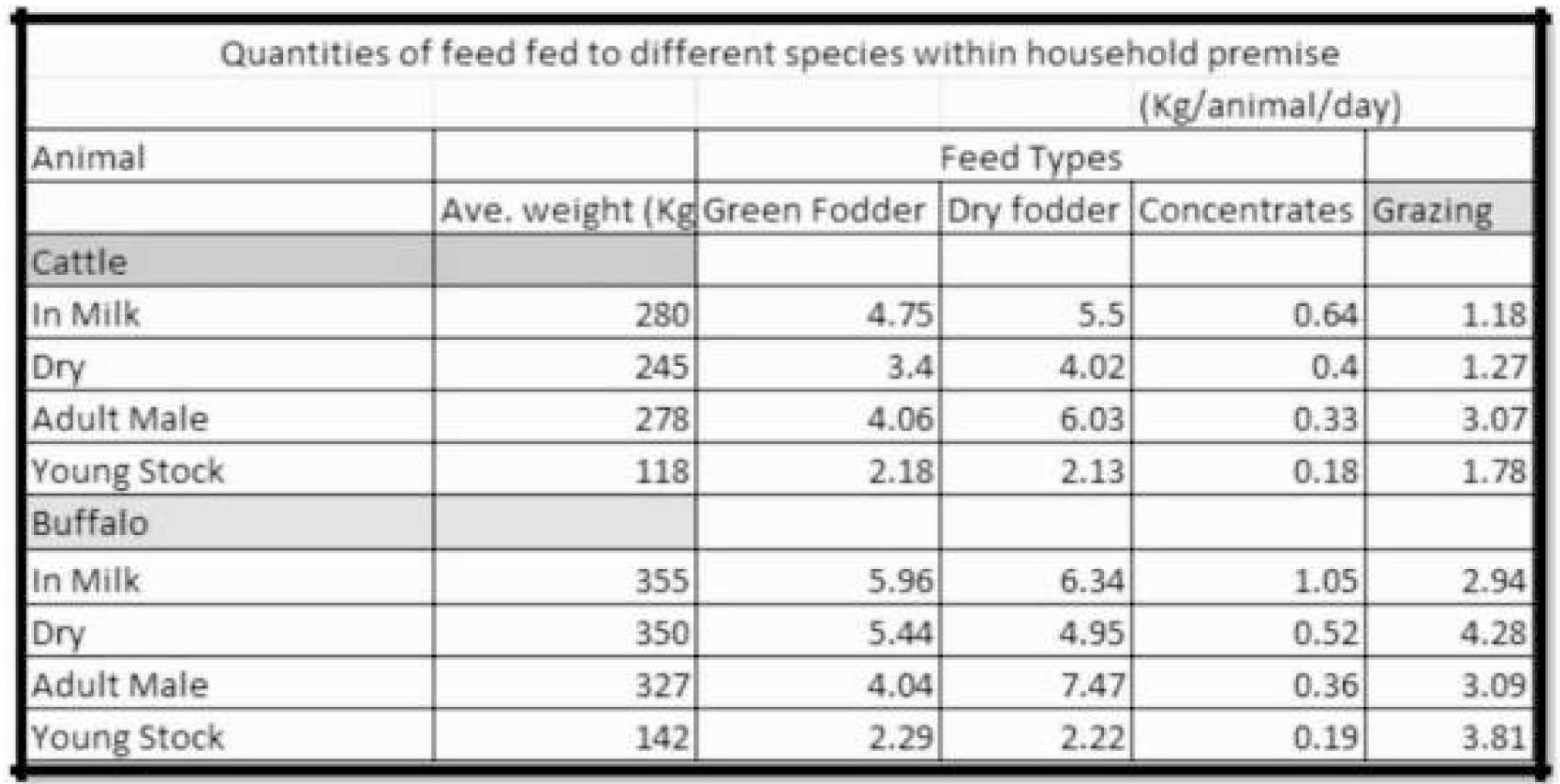
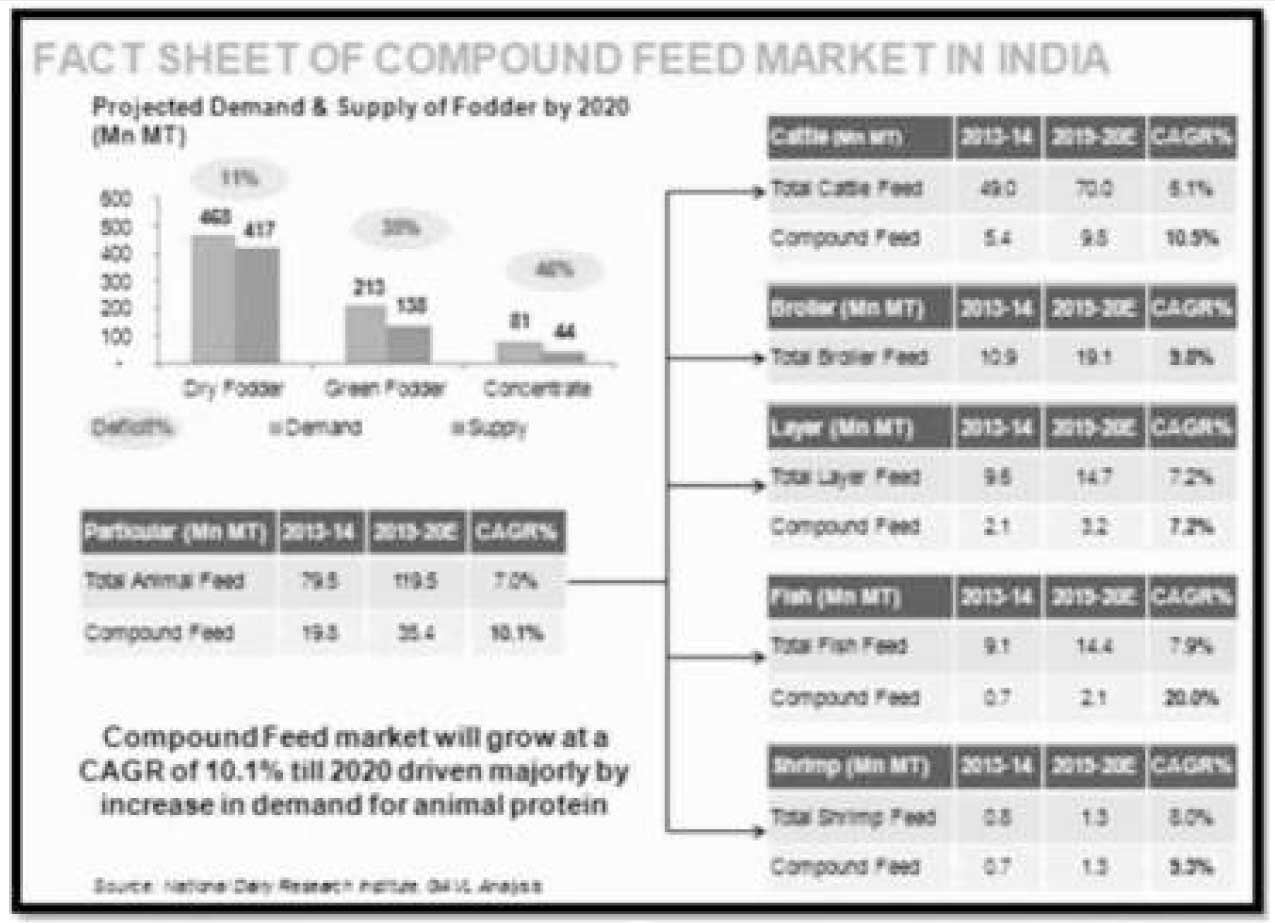
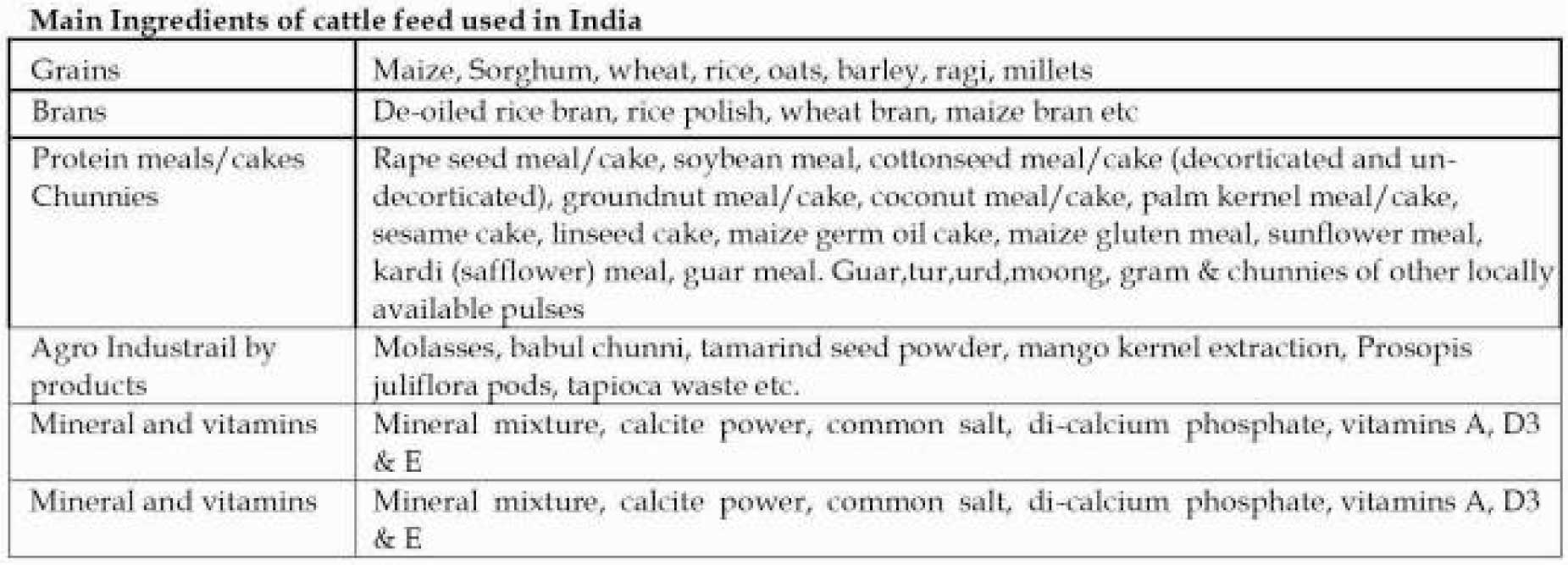
Different types of Compound Cattle feed
In India low, medium and producing animals in
different parts of the country, therefore, different types
of feeds are produced by feed milling plants. Variations
in feed formulations are also necessary due to
availability of different basal feeds in different seasons.
Specification for three different types of feeds
recommended by the Feed and fodder group,
constituted by the Department of Animal Husbandry
& Dairying, GOI are given below:
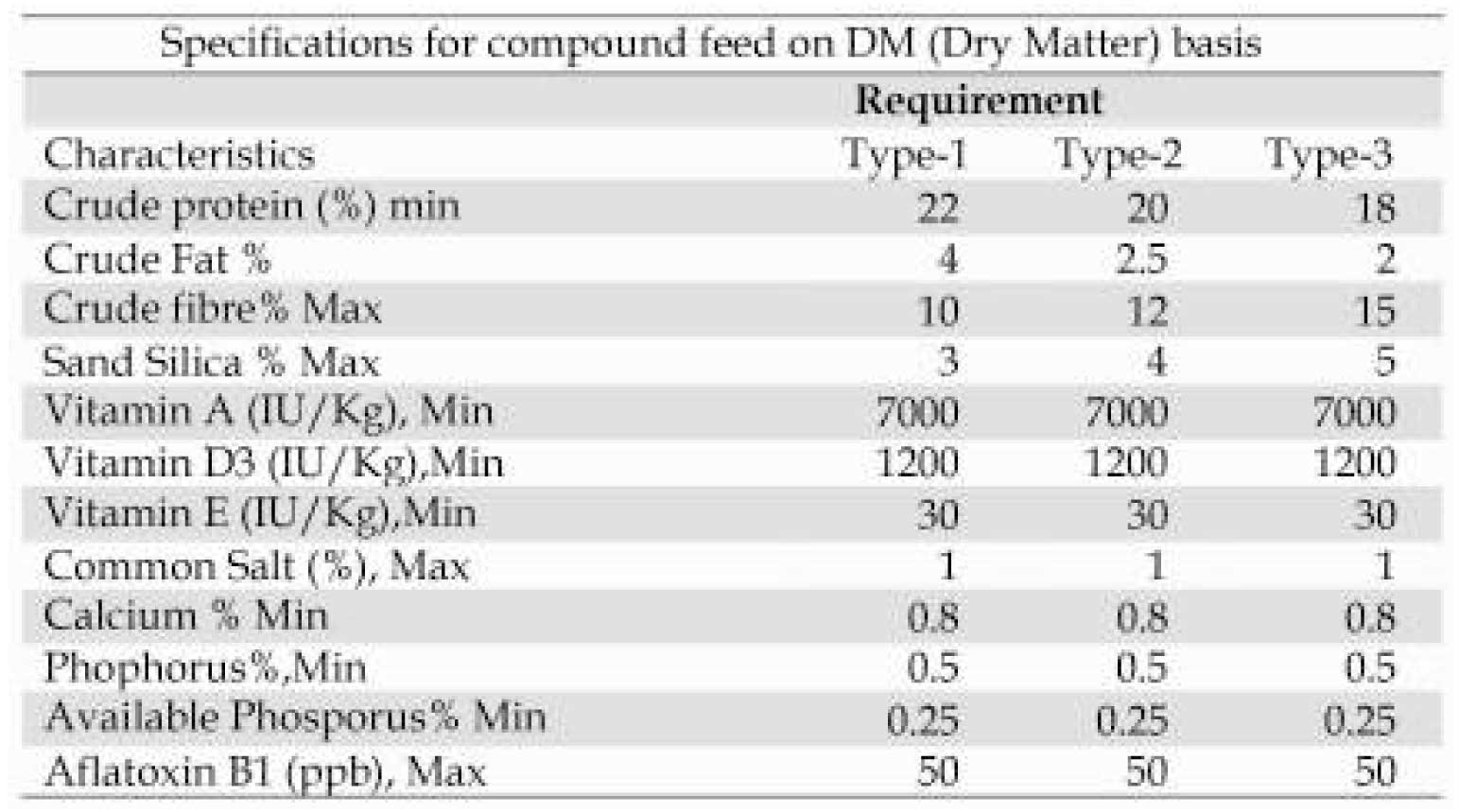
Contribution of different sources to Dry Matter
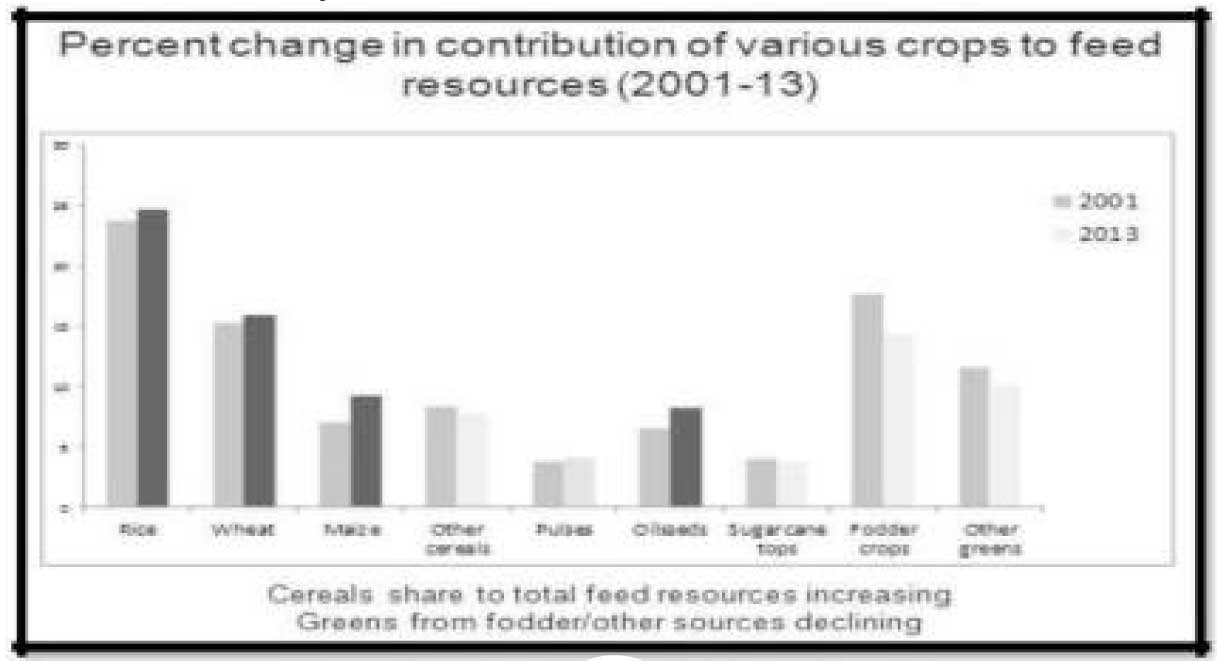
How much Compound feed Cattle to be fed
Cattle Feed can be fed directly or by mixing it with chaffed
dry/green fodder. Cattle feed need not to be cooked or
pre-soaked before feeding. If compound feed is uniformly
mixed with forages and fed, results are better. Animals
need to be fed compound feed as follows:

If 15-20 Kg good quality cultivated green fodder is
available for feeding the animals, then compound feed for
body maintenance need not be given.
Presently, in India only two types of compound cattle
feeds are manufactured for adult animals. Considering the
increase in milk yield, regional variation in feed
availability, preference of farmers it is required to produce
different varieties of compound cattle feed. As per NDDB
guidelines, NDDB also promotes use of different
compound feeds such as, calf starter, calf growth meal,
feed for high yielding animals, feed for low yielding
animals, buffalo feed, feed for dry or pregnant animals etc.
But in field observation only milking animals are fed with
compound feed. We have not seen Compound feed
feeding in Calf & dry animals. Further, farmers with one
two animals are hardly serious for use of compound feed
except during lactation period. It was found during
interaction with farmers in different regions of major milk
producing states that proper knowledge about benefits of
use of compound feed is missing and high price of
compound feed is another big concern among progressive
farmers. During my visit to Bihar & Bengal, farmers want
Compound feed in the rate home - made concentrate ( Rice
Bran+ Jaggery @Ra 15-20 Kg) or at the price at which
unorganized feed manufacturers are offering the product.
It was seen that local feed manufacturers
(unregistered/unlicensed) are selling feed in the range of
Rs 20-40/- per Kg.
During meeting with some of registered and big
Compound feed manufacturer, it was understood that
they also sell two types of Compound feed- High priced
and low priced, but they did not reveal the ingredients
and specifications. As per our broad estimates, Godrej
Agrovet is able to sell 50000 MT of Compound feed in
Maharastra, 50000 MT in Tamilnadu& Karnataka, 25000
MT in Bihar. No registered Compound manufacturers
were willing to talk about prescribed standards of low
price Compound feed quality.
Issues with feed & fodder in India
- As per XII five year plan of the Government of India, 5- 6% of growth rate in feed & fodder require to address the challenge of shortage of feed & fodder.
- Deficiency of feed and fodder accounts for half of the total loss in livestock production potential.
- Quality data and timeliness of data availability are serious issues.
- Only 5% of the farm household are able to access any information on animal husbandry against 40% of crop farming.
- Development of the cattle feed sector has not received enough attention in the past. (NDDB provide advisory services on commercial feed manufacturing only to the Cooperatives)
- Inadequate marketing ,financial and infrastructure support.
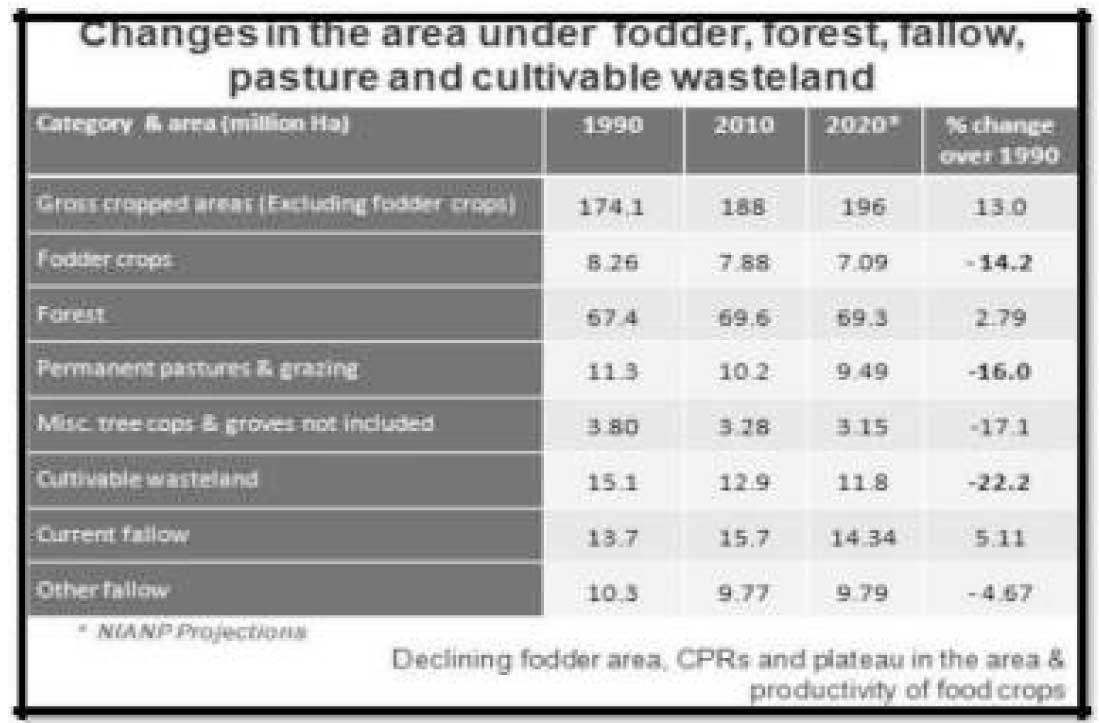
During meeting with Dr. RaghvendraBhatta, Director,
National Institute of Animal Nutrition and Physiology,
(NIANP), Bangalore it was understood that area under
Fodder crops, Permanent Pastures & Grazing and
Cultivable wastelands which are the major source of cattle
feed is shrinking drastically due to increase in demand for
real estate and infrastructure.
Further, large amount of useful paddy straw for livestock
is being burnt in the major Paddy producing states of
India. The Paddy straw is one of major source of dry
fodder for bovine in India, but handling and marketing
constraint at farmer level is the major reason behind
burning of the same in field.
Dr. Raghvendra also informed that the impact of climate
change is several regions are now visible and it is posing
challenge to livestock &live stock systems and need to
modify animal diets as increased temperature increase
lignifications of plant tissue and reduce the digestibility
and rates of degradation of plant species.
He suggested that small technological interventions in
feed & fodder management may bring big positive impact
and will solve fodder issue at maximum extent.
Crop residue Management :
- Bailing- dry fodder, transport and minimize losses
- Chaffing & Storage- reduce wastage and improve intake
- Urea Treatment- enrichment with nitrogen leading to better utilization
- Strategic supplementation- Improves the utilization of nutrients and improves productivity
Green fodder Management :
Strengthening of fodder
Seed chain
- Varietal and Management improvement
- Hay & silage making
Use of Alternate source of Feed :
Castor, Karanj, Neem, Mahua, Shea nut cake, Jatropa,
Tomato Pomace , Brewery Waste, Areach sheath, Azola
(algae), Pineapple fruit residue, Banana leaves, Cassava
tops, Corn cob, Cotton seed hull, Sunflower head, Coffee
pulp, Coffee bran/hull, Cocoa pods.
As per our estimate, the export of oil seed cake/meal has
drastically came down in India from 5 Million tonne to 2
million tonnes from 2011,due to low production of oil
seeds. Currently India is exporting around 2 Million
tonnes of protein meal to South Korea and Middle east
countries and other side import of oil seed cake/meal is
limited to save guard the domestic producers. Hence, such
scenario will impact the compound feed manufacturers
who are using oil seed meal as base material for
commercial feed.

Primary study on De-oiled rice bran use and its availability
in major states revealed that Deoiled rice bran (present
rate- Rs 10/- 11/- per Kg) is used as major source of protein
for animal feed in western part of country. AMUL (Anand
Milk Union Limited) and other major dairy cooperatives
are buying large quantity of Rice bran as a basal for low
cost compound feed production.
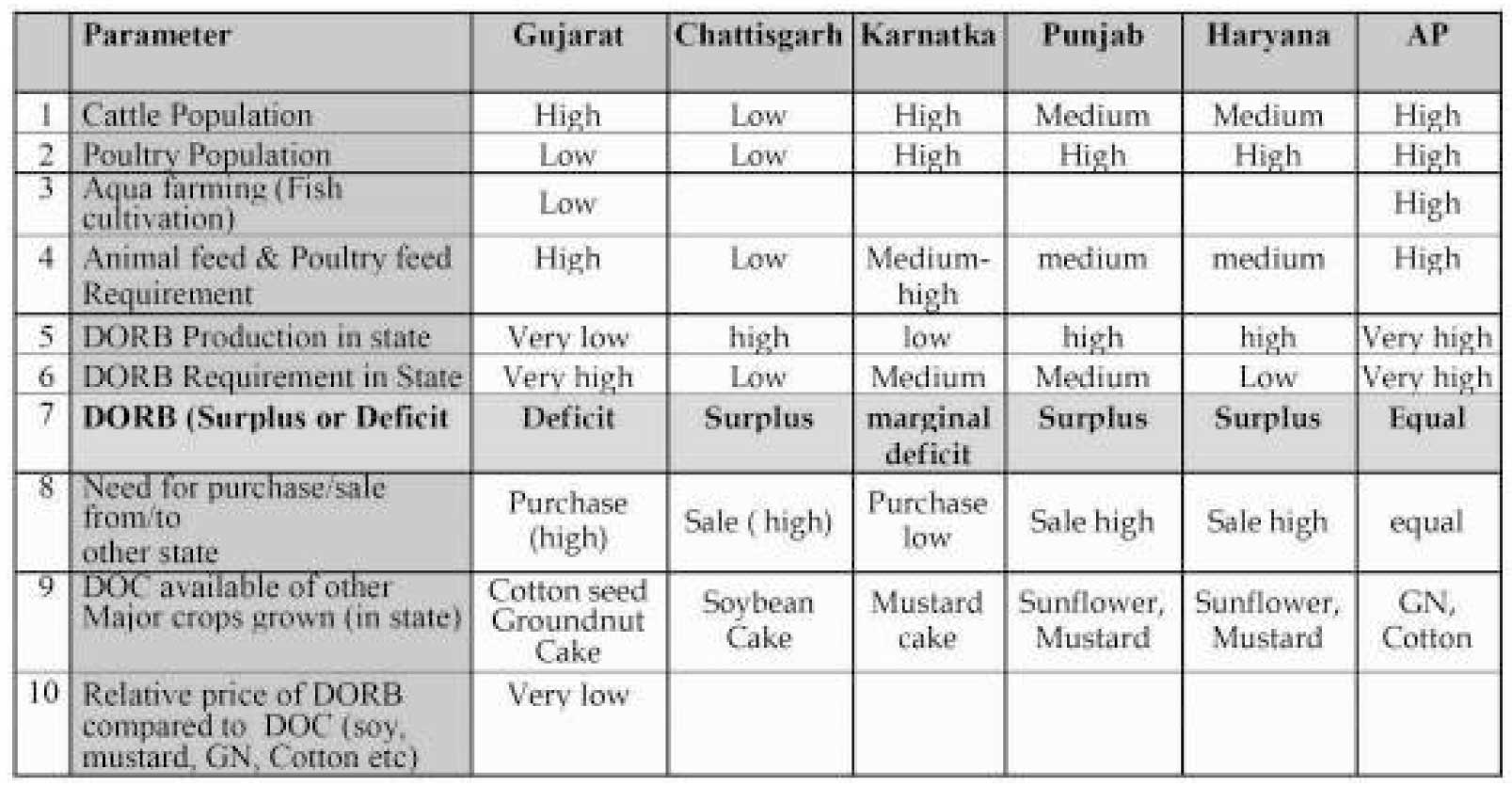
In above table, multiple parameters have been taken into
consideration for assessment of exiting dairy/poultry feed
demand dynamics along with availability of DORB in
respective state. This also indicates Surplus/deficit state in
terms of DORB Production.
As visible in above table, Punjab, Haryana & Chhattisgarh
is surplus states where as Gujarat, Rajasthan (not in table)
is most deficit state as far as DORB is concerned. Hence
demand from deficit state dictates price of DORB
prevailing in Punjab and Haryana. (Note: relative price of
other DOC in market is also taken into consideration)
Further major consumption of animal/poultry feed is
reported in Punjab, Gujarat, UP, Rajasthan, Maharashtra,
AP, Karnataka and Tamil Nadu (Mostly western &
southern states). Movement of DORB is reported from
surplus states to deficit states and requirement in deficit
states dictates its price. Normally DORB from Punjab &
Haryana is transported to Gujarat & Rajasthan and
purchase price in Gujarat becomes the benchmark price
for DORB in these states.
To bring to notice, West Bengal (Eastern India) is one of the
leading producers of de-oiled rice bran. The high railway
freight from West Bengal to western or southern India
makes transport unviable for the producers in Eastern
India, thereby compelling them to export de-oiled rice
bran to the neighboring countries.
Drought or excessive rain in few provinces, El Nino
impact, paddy/ edible oil crop failure in one or multiple
state drives relative DORB demand in the market. The net
realization from sale of DORB, influences solvent
extraction margin and indirectly affects pricing of CRBO
as well. Hence parity in DORB sales realization is one of
the indicators of rising/declining pace for production of
CRBO.
Though Rice bran must be processed immediately after
milling within 1-5 days (if possible), a solvent extractor
has no choice but to do extraction irrespective of DORB
price ruling high or lower (if bran already purchased).
However, if parity is not met he will stock DORB&sales at
appropriate time. As demand for CRBO for last 3-4 yr has
been very encouraging with expectation of rising demand
and prospective future, a higher extraction of more
RiceBranmay be visible in next 3-5 yr.
The Recent ban on beef product in India is indirectly
helping more feed/fodder requirement for dry animal. As
dry animal could not be culled and have to fed with
additional feed/fodder to keep it alive. This indirectly,
may push marginal additional demand for all feed
products including DORB.
At Poultry feed industry front, seasonal demand from this
industry also influences pricing of DORB. During winter
month, demand of feed material rises, whereas in summer
it reduces by 20-25%.
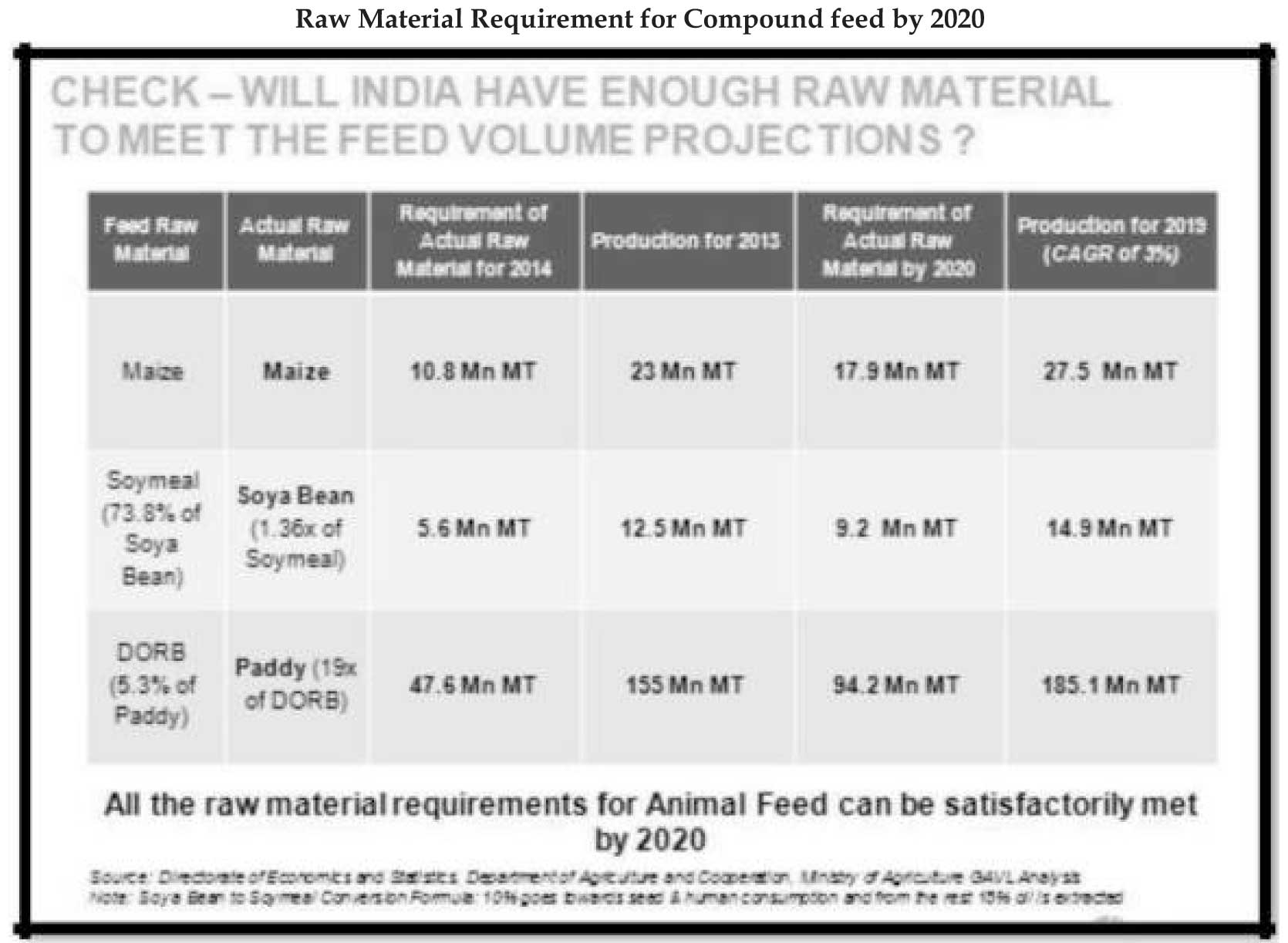
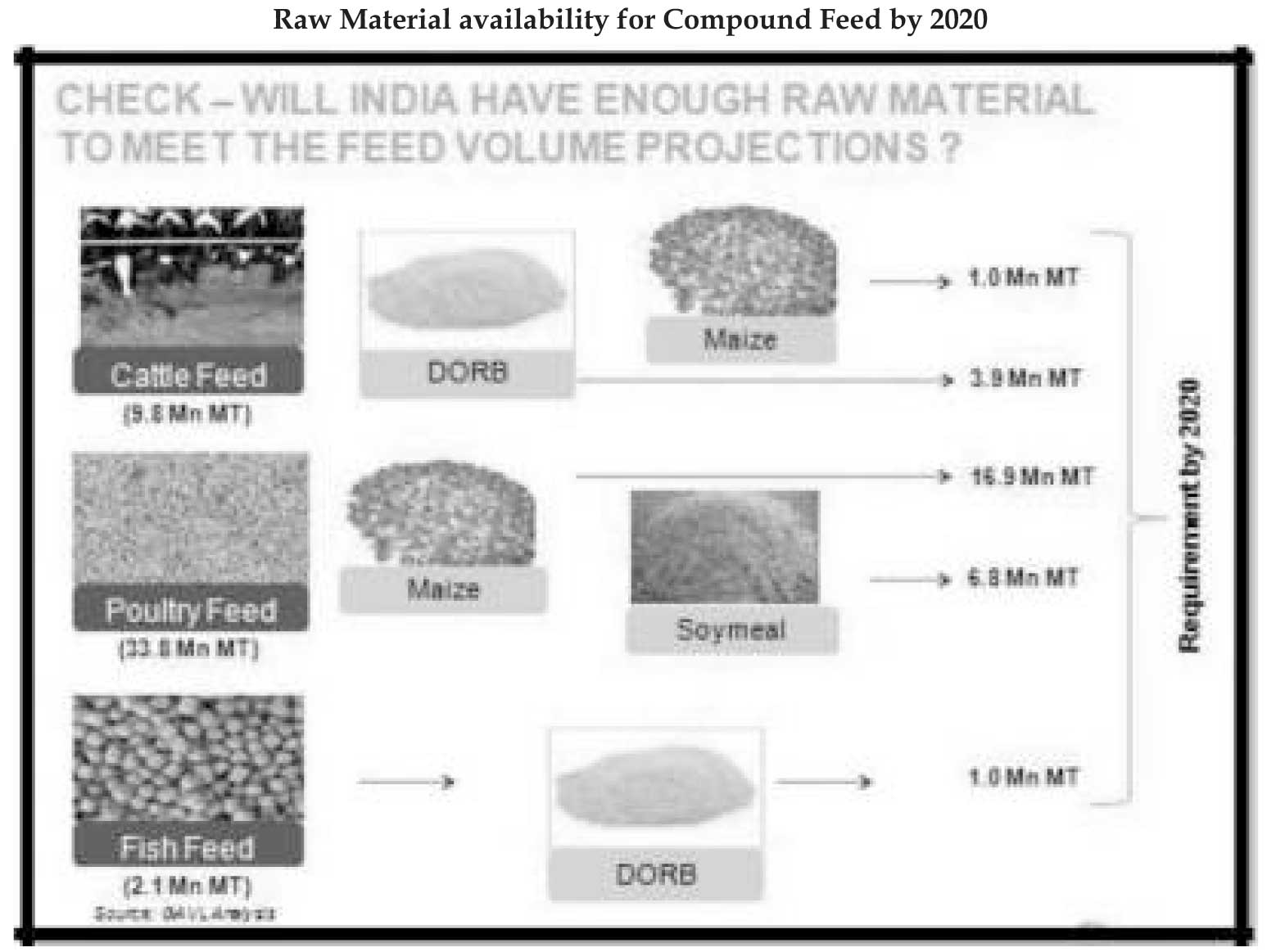
While raw material is not a problem then Govt plan seems
like a case of misplaced priority. The below slide is
showing poor allocation of funds is Animal Husbandry &
Livestock which contributes 23% to the total output from
Agriculture.
Further, poor execution adding budget verses actual
utilization of funds to the negative impact. Private sector
will have to fill the gap created by the Government in
driving agriculture. The Gaps to filled mainly in
Education of farmers about live stock management.
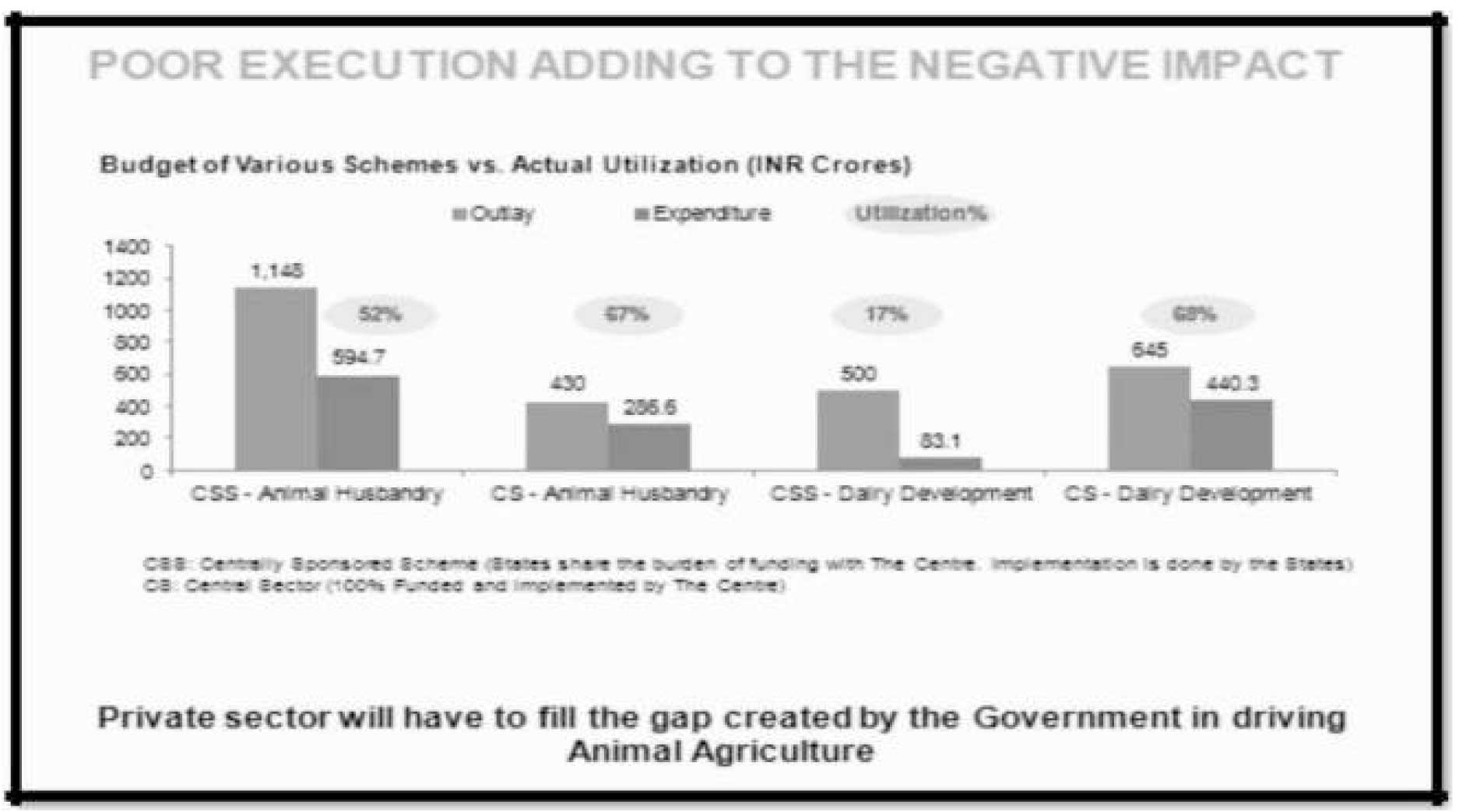
Issues before Compound feed manufacturers in India :
Indian Feed manufacturing Industry is paying higher prices for main protein meal i.e Soy mean than in International
price due to high duty paid import & export.
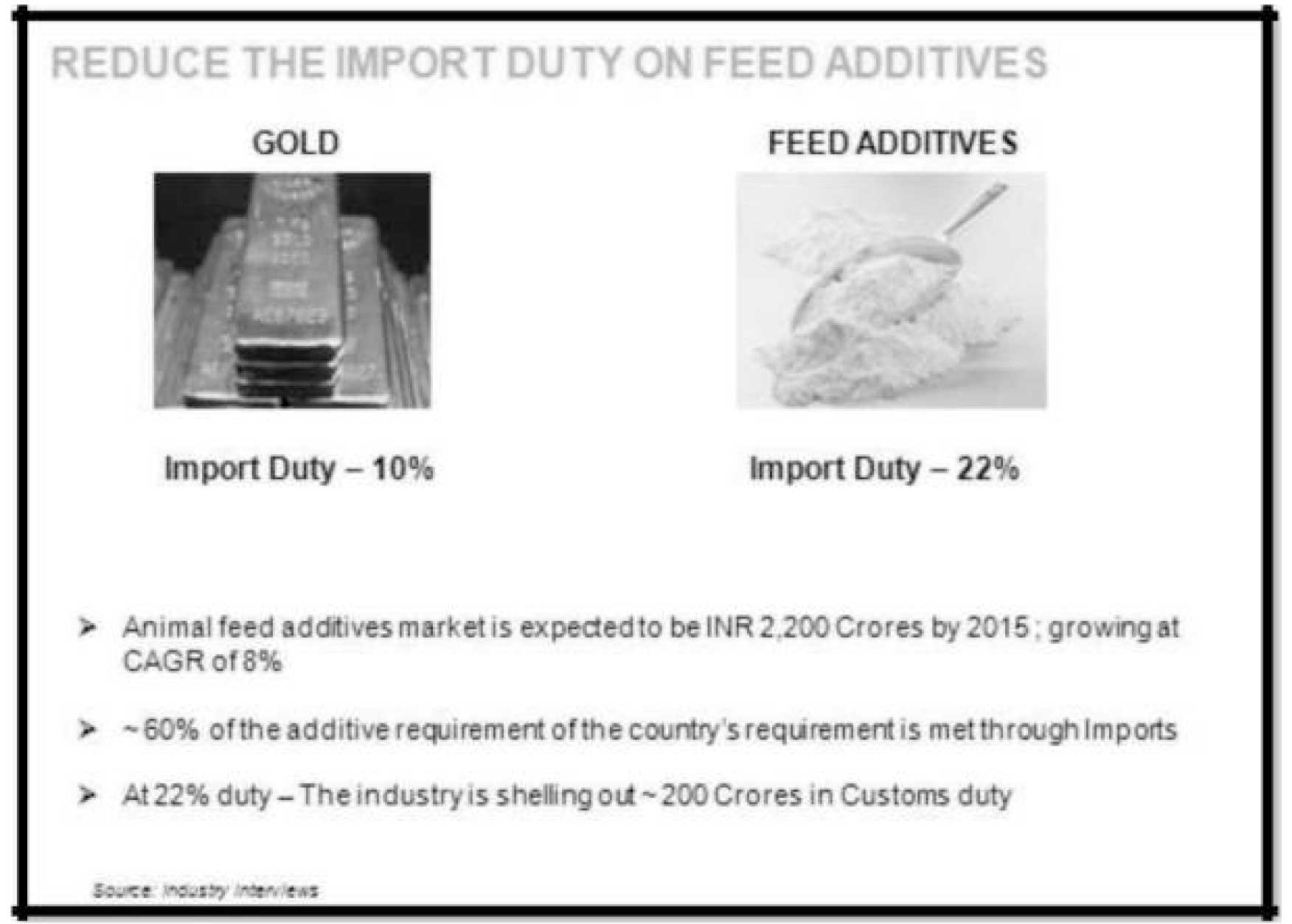
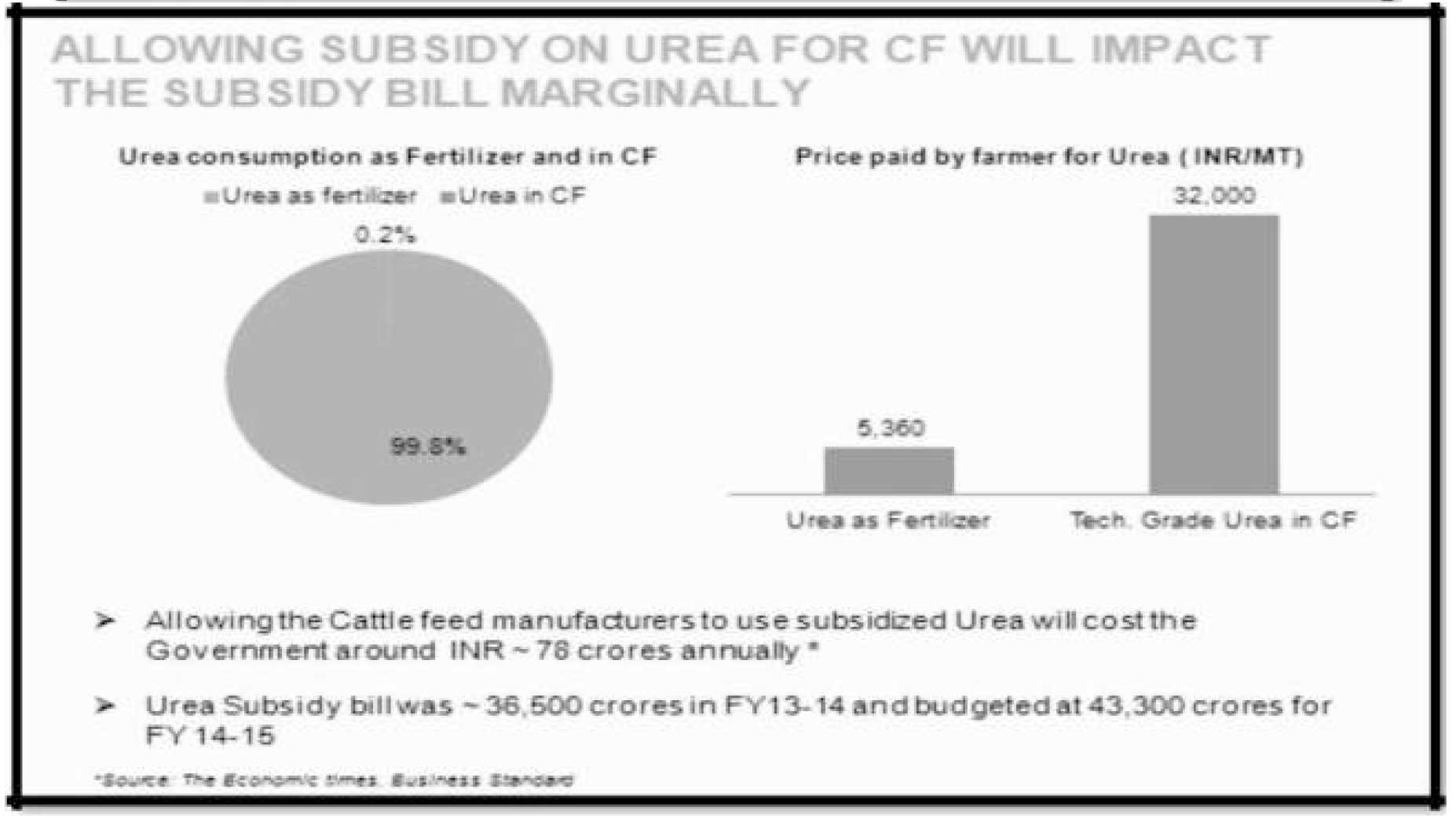
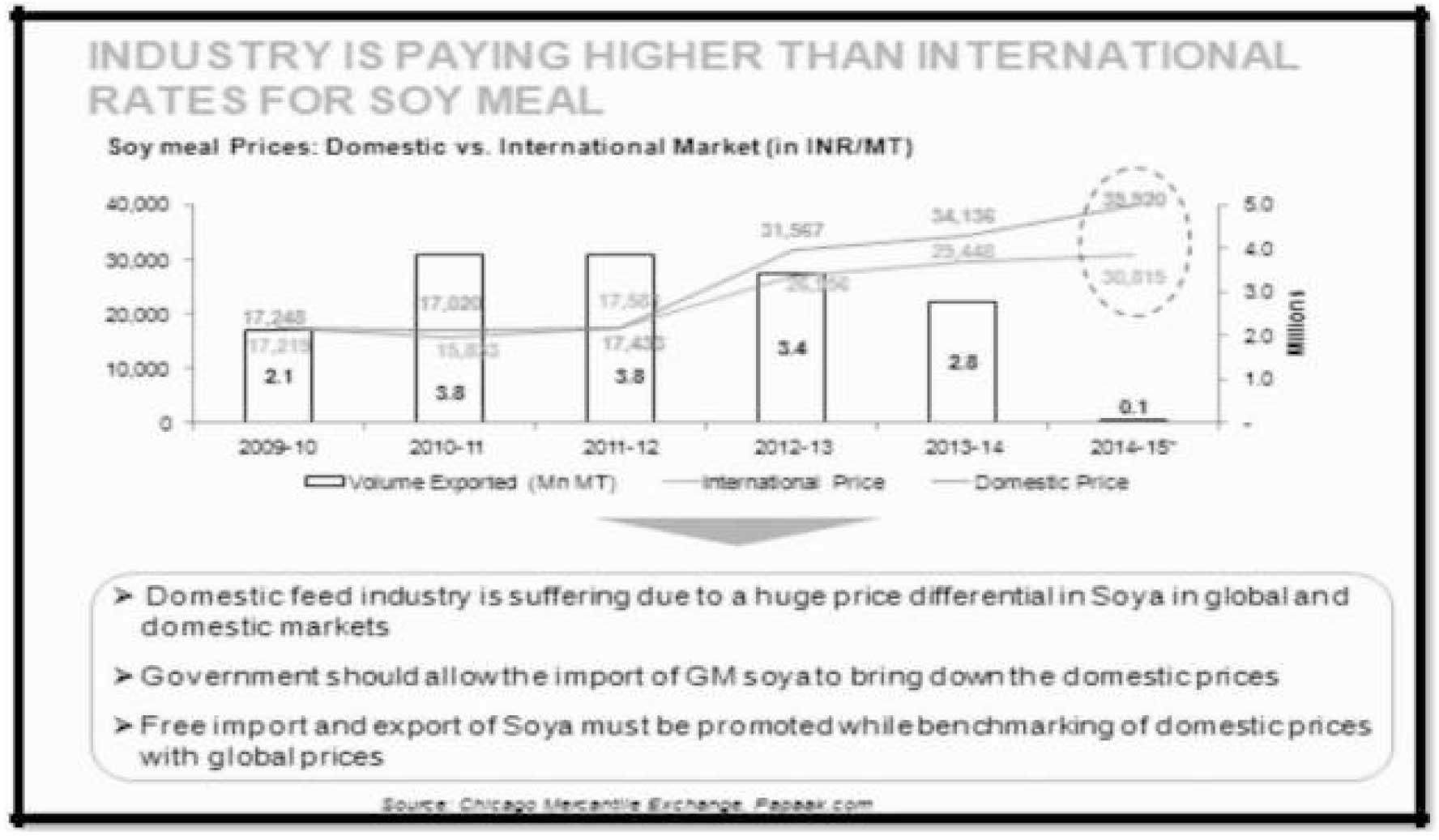
Finally, major issue is Import duty on feed additive which
India is majorly importing from China. The high price feed
additive for cattle feed is stopping farmers to choose extra
supplement for milk enhancement and adding high cost to
quality feed.
Eventually, we can say that the commercial/compound
feed exploitation is must for better milk production and
animal health.
References :
- A.K.Dikshit & P.S. Birthal, 2010. India's Livestock Feed Demand : Estimates and Projection, published in Agricultural Economics Research review Vol.23, January- June 2010 pp 15-28.
- Retrieved from URL ht tp://www. fao.org /docrep/article/agrippa/ x9500e01.html.
- http://www.nddb.org/services/animalnutrition/ cattlefeed.
- ht tp://www. abhaycot e x . com /Inve s tor _ cattlefeed.html#sthash.26ssUCy7.dpuf
- http://www.animal-feed- india.com/ history.htm
- http://www.slideshare.net/DrSandeepJuneja/ india-livestock-feedopportunity.
- Interview with Dr. RaghvendraBhatta, Director, NIANP, Bangalore.
- Interview Mr. Amit Sarogi, President, CLFMA, Mumbai.
- Industry Interviews, field visits.
- Data base obtained from Transgraph Consulting Pvt. Ltd.
- Jhon MP Paper published in International Global Research Analysis Journal on Cattle feed Market in Kerala: A Study of purchasing behaviour pattern and Buyer behaviour, Jhon MP, Ph.D Scholar, Karpagam University, Coimbatore, Tamilnadu, India Dr. Manoj Research Guide, Assistant Professor, Deaprtment of Applied Economics, Cochin University of Science & Technology, Kochi, Kerala, India.
- D. Babu and N.K.Verma, 2010, Value chains of Milk and Milk Products in Organized sector of Tamilnadu- A Comparative Analysis published in Agricultural Economics Research review Vol.23. January-June 2010 pp 479-486.
